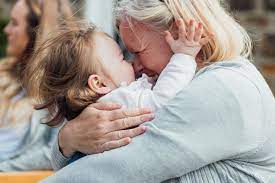There is no denying the special bond that exists between a grandmother and her grandchild. And until recently, few scientific studies have shown just how special that bond is.
In a recent study conducted by Emory University and published in the journal Proceedings of the Royal Society B, researchers observed the brains of grandmothers watching their grandchildren. In doing so, they were able to truly explore this special bond.
“What stands out in the data is the activation of brain areas associated with emotional empathy,” explains James Rilling, professor of anthropology at Emory University and lead author of the study.
Rilling continues: “This suggests that grandmothers are oriented to their grandchildren’s feelings when they interact with them. If their grandchild smiles, they sense the child’s joy. And if their grandchild cries, they sense the child’s pain and distress.”
In contrast, they observed the grandmothers’ brains when they looked at images of their children. They found that the areas of the brain related to cognitive empathy lit up, instead of emotional empathy.
Based on this data, it could be said that the grandmothers’ brains lit up in these areas because they are trying to understand their child’s feelings, but differently. In addition, the age difference between child and grandchild could and most likely does cause this phenomenon.
“Young children have probably evolved traits to be able to manipulate not only the maternal brain, but also the grand maternal brain,” explains Rilling. “An adult child doesn’t have the same cuteness ‘factor’, so it doesn’t necessarily elicit the same emotional response.”
The importance of a grandmother being present in her grandchild’s life cannot be denied. Even Minwoo Lee, who co-authored the study, explains how this study demonstrates this.
“Here we highlight the brain functions of grandmothers that can play an important role in our social life and development,” and continues, “This is an important aspect of the human experience that has been largely left out of the neuroscience field.”
Within the family unit, it is common for each person to play a role in the child-rearing process. While many focus on the role of the mother and father, Rilling believes that the grandmother also plays a central role.
“In some cases, grandmothers are the main helpers,” he says.
To carry out the study, they asked 50 participants to fill in questionnaires about their experiences as a grandmother. In addition, they performed brain scans while they looked at images of their grandchildren. In addition, they had them look at images of unknown children, their children and an adult stranger.
When they looked at images of their grandchildren, the area of the brain associated with emotional empathy and movement lit up, showing that they wanted to play an active role in their grandchildren’s education.
“Our results confirm that there seems to be a global system of parental care in the brain and that grandmothers’ reactions to their grandchildren are part of this system,” says Rilling.
Of course, I don’t think we need a study to tell us how important our grandmothers are, but it was still fascinating to look at this study and its findings.










